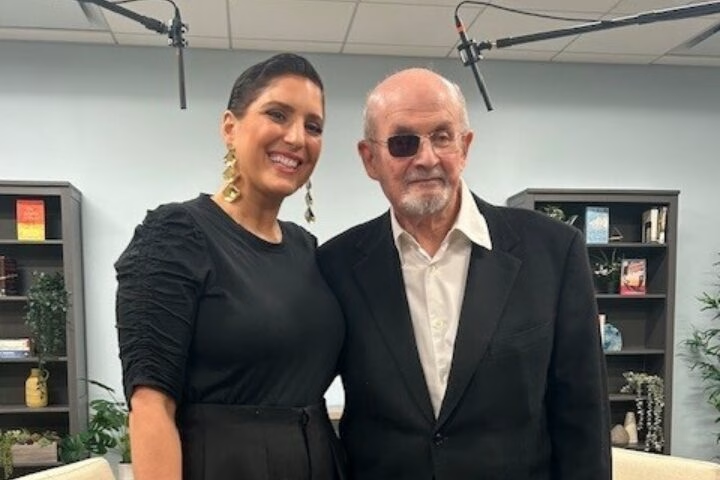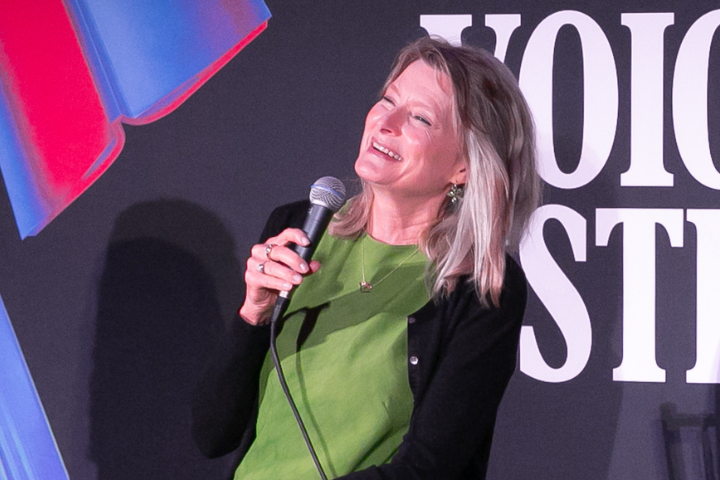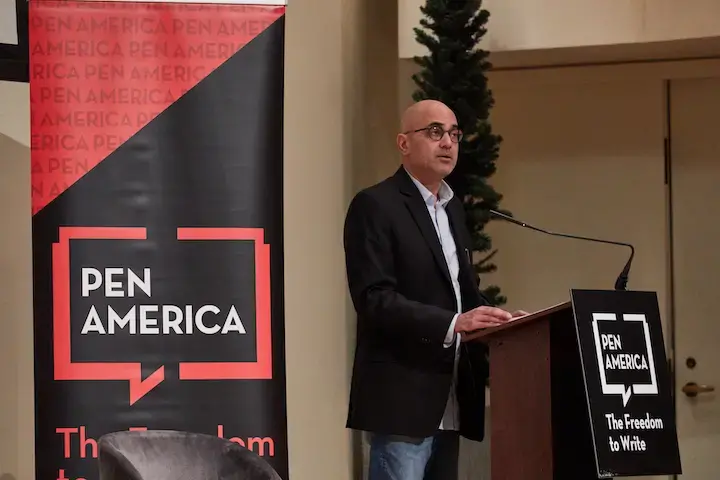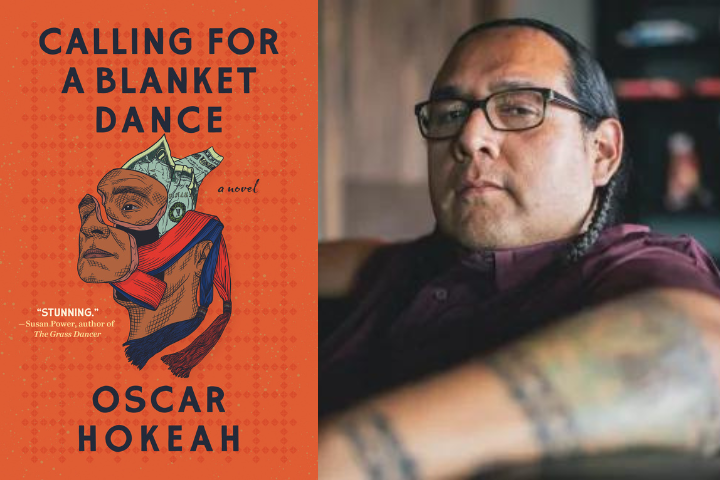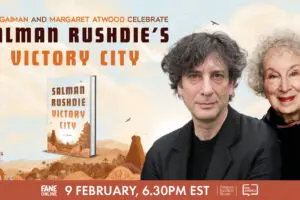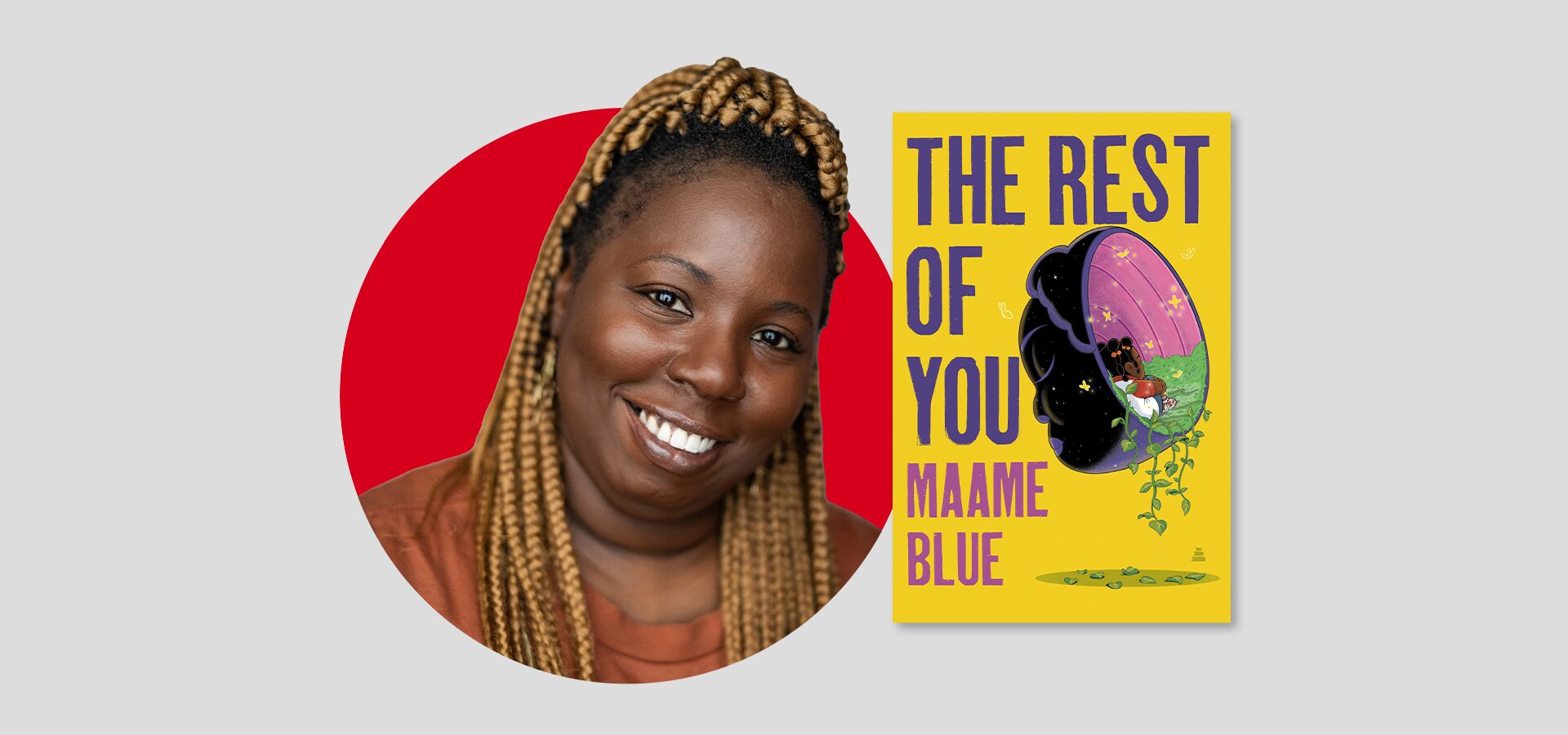
Internationally award-winning writer Maame Blue’s latest novel, The Rest of You (Amistad, 2024), tells a story that spans countries, generations, and points of view. Massage therapist Whitney Appiah has an unknown talent: When she applies pressure with her hands in a session, she can sense where her clients’ deep-rooted trauma lies and help them heal. However, it isn’t until she is assaulted herself that she starts to uncover her own childhood trauma from before she moved to London from Ghana. Written in fragmented memories and various perspectives, The Rest of You shows us that in order to move forward we must contend with the past.
In conversation with World Voices Festival and Literary Programs Coordinator Sarah Dillard for this week’s PEN Ten, Maame Blue discusses her use of the second person, how she outlined complex timelines, and why a sense of place is at the heart of Black British culture. (Bookshop; Barnes & Noble)
The Rest of You takes place in several different countries. For protagonist Whitney, she doesn’t remember her time in Ghana as she immigrated to London when she was a toddler. However, she feels connected to her home country which is referenced throughout her sections. How is a place a part of a person? When writing, how does place define your characters?
Connecting a narrative to a place is one of the ways I often anchor my characters. I think for all of us, the various places that we might have called home throughout our lives will inevitably shape who we become as adults. For Whitney, her early life in Ghana was filled with love, thanks to the women taking care of her. So, even though she has no memory of it, her senses still leave her with a deep longing for a place that significantly impacted her early sense of self. Meanwhile, for Whitney’s auntie Aretha who ends up in Copenhagen, her search for place is directly related to her search for personal freedom and validation. For all of these characters though, the act of migration, of leaving somewhere to find home in a different place, defines who they are.
Whitney’s sections are written in the second person using “you” as the address instead of “I” or “she.” In the beginning of the novel, this point of view experiences a sexual assault. Why did you decide to have this traumatic moment open the book and feature it with a perspective that integrates the reader?
I know that many readers do not enjoy the Second Person voice – it is intimate, uncomfortable and at times can feel voyeuristic. But that is also an accurate description of Whitney’s feelings when the book opens, and I wanted to convey that as simply as possible. However, it’s always difficult to read trauma, let alone begin with it. But my desire for The Rest of You was always to ask: what happens after the trauma? So rather than leave the reader to experience her trauma for an extended period of time (which isn’t ever something I ever want for my readers), I wanted instead to revisit it in Whitney’s memory and introduce it at the start of her journey to healing, rather than just as a bad experience for the sake of it.
It was perfectly normal in my own family to hear an elder talk about some decades old curse that still haunts someone, and whether I believed it or not, their belief made it real. I wanted to explore the idea of these cultural things being introduced and people living their lives around them, or sometimes in direct conversation with them, without ever needing to know what is and is not ‘true’.
There are many characters in the book who are not only related but who have each experienced their own personal traumas and significant life events. What was your organizational process? Did you create a timeline or a more detailed genogram to outline all of the people involved?
I actually ended up approaching the two parts of the book (present day London and mid-1990s Ghana, London and Copenhagen) very differently. With the present day London aspects, each of those characters emerged out of relationship with Whitney, and depending on what her character arc required, the other character’s arcs and backgrounds also evolved in tandem. Whereas for the Ghana-based parts, I spent a year researching the time period, Ghanaian history, and 19th and 20th Century family structures. Then I took a course on writing historical fiction, to really map out each of the characters, from their desires and personalities, to the context that they lived in and how they might interact with their environment. So by the time I was writing the Ghanaian chapters, I had already completed the London chapters, and it ended up coming together like pieces of a generational puzzle.
Aunt Vida tells her nieces Ma Gloria and Aretha about the curse that was placed on the family in the late 18th century and concludes: “…when new life comes, death follows soon after.” . What made you decide to highlight this cycle as a main thread in the narrative?
I think amongst Ghanaians (and likely other cultures across the African diaspora) there is always someone (or sometimes several people) in the family who believe in curses and have a story about it running through some branch of the family. It was perfectly normal in my own family to hear an elder talk about some decades old curse that still haunts someone, and whether I believed it or not, their belief made it real. I wanted to explore the idea of these cultural things being introduced and people living their lives around them, or sometimes in direct conversation with them, without ever needing to know what is and is not ‘true’. In Gloria’s case, she hears this story and isn’t questioning its facts or fiction, but rather the very real impact that kind of oral narrative has on everyone else’s collective actions going forward.
There is a strong patriarchal influence on the family in Ghana with Daddy, uncle Clinton, and Paa Kweku holding a lot of power. At the same time, the matriarchs (Ma Gloria, Maame Serwaa, and Aretha) will act independently, stand up for themselves, and do most if not all of the caretaking. What was your intention behind including this dynamic in the novel?
I was really interested in the portrayal of a middle class Ghanaian family at that time; one which by all accounts is financially doing well because of the patriarch of the family, but actually that results in his (Daddy’s) absence, which inevitably requires the women, his children and house help to be the ones to actually keep the family running and together. This is something Black women have long been thrown the burden of responsibility for, and I wanted to show what happens when they accept that responsibility, but the very real sacrifices they make (like their own desires) in order to enact that choice.
Writing about community was the most enjoyable part of writing The Rest of You, and inevitably it made me seriously question my own relationship with community, given that writing can be such a solitary venture.
During one of Whitney’s massages for Ma Gloria, she thinks: “As if pain were a right of passage.” How did the historical treatment of Black women and their subsequent resilience influence the story?
Whitney’s relationship with Ma Gloria is very close but there is a barrier between them; something that Whitney suspects is fuelled by a past pain that she doesn’t know about. That scene is much more about the ways Ma Gloria endures pain from Whitney’s perspective, and how Whitney wishes to ease it, even if she doesn’t understand it. But that notion of resilience is definitely a theme throughout the book; only it emerges not through gritted teeth but in the supportive relationships amongst the characters. Their resilience is reenergised by their care for one another.
One of the main themes throughout The Rest of You is the impact that trauma has on the body, which causes disconnect. Through massage and grounding, characters are able to reclaim their bodies as their own by focusing on what they physically feel in a present moment. Was writing this novel similar to these practices of centering physically? If so, what was it like putting pen to paper or fingers to keys?
The short answer is yes, the writing of the novel was in itself a sort of physically healing practice. I was writing it all throughout the pandemic, from lockdown to lockdown as we all watched countless people lose their lives to a worldwide virus. I think collectively, we were also losing parts of who we thought we were as humans, that we both needed and relied on each other, and in acknowledging that, we also needed to distance ourselves from one another to keep people alive. I think physical touch became, for a while at least, a sacred act that required new levels of permission if we were to engage again. The essence of that; of having a character so physically intuned with others even as her own physicality was being threatened by a sense memory, felt necessary to the story. And that was inevitably heightened in importance given the context I was writing the book within.
Community has a dual nature in the book. There are benefits such as support, care, and history with one another but there are also downfalls like gossip, inequality, lack of opportunity. What value does community hold for you? As an author, do you connect with fellow writers about your work?
Writing about community was the most enjoyable part of writing The Rest of You, and inevitably it made me seriously question my own relationship with community, given that writing can be such a solitary venture. I realised that I am and have always been a bit of a floater. I have groups of writer friends from different projects and different points in my life, rather than a core group, if I’m honest. I have moved around so much in my life, and currently I split my time between London and Melbourne. So my writing community is in bits and pieces, though they are the best bits. I recently attended a writing masterclass with incredible author Leone Ross, and a small group of us were thrown head first into sharing new writing, critiquing and challenging each other. It was exhilarating and terrifying, but as a group we’ve kept contact, hoping to connect our work again in that way in the future.
My advice would be for younger generations to talk to those elders if they are able — ask questions, be curious and try to fill those gaps in their collective memory. If nothing else, it will likely bring you closer to an understanding of what came before you, and what pathways were laid out for you to arrive where you are today.
The novel centers around being Black British (the fastest growing and largest Black group in the UK according to BBC) and their experience. You reflect on the importance of family, religion, and culture in the everyday lives of those whose families immigrated to England from Africa. What do you hope readers learn about the Black British community from your novel?
I am sure you’ve heard this before, but primarily that we are not a monolith and that the experience of migration, whether experienced directly or one or two generations behind us, is what ultimately connects us. So much of Black British culture today is a mixture of West African and Caribbean heritage, language, food and music. But its heart begins with a sense of place, and for Black Brits I think sometimes we can forget how fortunate we are to have that; to be able to trace our lines of heritage back to the African continent, and point to a place that suggests belonging.
Toward the end of the novel, you write “Your moments no longer felt linear…” in one of Whitney’s final sections. As you’ve gotten older and have published more, what advice would you give to the younger generation? How would you encourage them to preserve their memories?
For me, writing this book was the perfect excuse to connect with the elders in my family; aunties, uncles, older cousins, and listen to their stories, to get a real sense of their experiences. I write in the book that most memories are shared and viewed from different angles, so my advice would be for younger generations to talk to those elders if they are able – ask questions, be curious and try to fill those gaps in their collective memory. If nothing else, it will likely bring you closer to an understanding of what came before you, and what pathways were laid out for you to arrive where you are today. I think if those conversations can happen, then no matter how difficult or unexpected, there is the potential for healing within them.
Maame Blue is a Ghanaian-Londoner and award-winning author of the novel Bad Love, which won the 2021 Betty Trask Award, and was shortlisted for the Betty Trask Prize. She has been a scriptwriter on a Venezuelan telenovela remixed for African audiences, and her short stories have appeared in several international anthologies, including Not Quite Right For Us, New Australian Fiction 2020, and Joyful, Joyful. Maame is a recipient of the 2022 Society of Authors Travelling Scholarship and was a 2022 POCC Artist-in-Residence. Maame contributes regularly to Writers Mosaic and has written pieces for Refinery29, Black Ballad, and Society of Authors Magazine. She is a Faber Academy and City Lit Creative Writing Tutor and regularly runs creative writing workshops. She lives in London.

